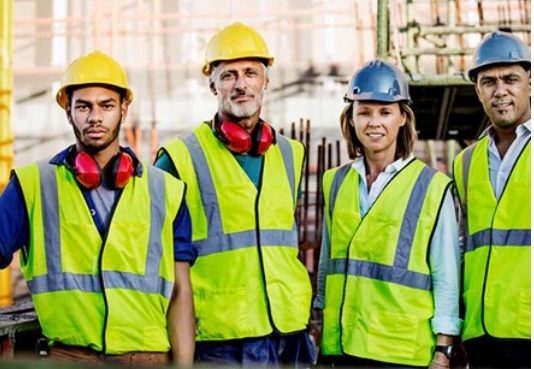The Hardhats with Heart Initiative

Did you know construction workers are disproportionately affected by heart disease? One in four tradesworkers have high blood pressure, some even being unaware of it before its too late! While construction careers are active jobs, some even say a replacement for the gym, that doesn’t automatically grant tradesworkers a path to great health. After speaking with Lily Banning of the American Heart Association (AHA), we learned there are multiple factors for this heightened risk for heart-attack and stroke for tradesworkers.
Hardhats with Heart is an initiative under the AHA that came to existence when a volunteer, Bart Dickson, President and Founder of Cobalt, spoke up about the frankly unacceptable amount of times he had to make calls to the families of his workers to let them know their loved ones had suffered from a heart attack or stroke on the jobsite. After some investigation, it became clear that there is a direct connection between stress and heart health for tradesworkers with the mental and physical demands of the jobs often being exacerbated by unhealthy coping habits such as poor diet, increased use of energy drinks, use of tobacco products, as well as lack of information about the warning signs of cardiovascular disease.
The AHA is also exploring the role of workplace culture as a contributing factor to overall stress levels and heart health. Jobsites where workers experience harassment and discrimination are hostile work environments which not only negatively impact worker safety, productivity, and retention, but also heart health and overall well-being! These impacts are intensified for women and BIPOC tradesworkers, which is why Oregon Tradeswomen focused on jobsite culture change work: we are an affiliate trainer of RISE Up – a bystander intervention model to prevent bullying and harassment, and part of the work around Safe From Hate which calls on all industry stakeholders in the construction industry to advance diversity, equity, and inclusion by clearly addressing jobsite culture.
With help from construction companies and construction-adjacent organizations like Oregon Tradeswomen, the American Heart Association started Hardhats with Heart in 2017 with three local priorities here in Oregon: Increase access and education about healthy diets, help tradesworkers manage chronic disease, and reduce the high risk of heart disease in tradeswomen. Hardhats with Heart is working hard with the local construction industry to provide jobsite trainings on health and stress-management, offering on-site blood pressure screenings, and creating a virtual Resource Hub for tradesworkers and their employers to learn more about the simple ways they can help prevent heart disease and deaths.
This online Resource Hub is dedicated to health information specific to the construction industry with the intent of being free and easily available. Subjects include nutrition, mental well-being, fitness, managing blood pressure, and more! When we asked the AHA’s Community Impact Director, Lily Banning, about what she wanted our audience to know about these online resources, she told us, “Hardhats with Heart is rolling out a series of industry-wide trainings for free! There is a focus on a different topic for every month starting this July, running through December. We encourage all tradesworkers and their employers to join in on the conversation and get their questions answered!”
Hardhats with Heart looks to continue improving its resources and the services they offer to tradesworkers so that the number of lives lost from preventable disease is reduced. To do this, they want to hear from you! What are you doing to take care of your health? Is there a focus on health, both heart specific and holistically, on your jobsite? What can Hardhats with Heart do for you?
If you are passionate about this issue and want to contribute or want to learn more about how to get involved with Hardhats with Heart, please contact Lily Banning at Lily.Banning@heart.org.
As a community, the goal is to provide free and easy to access free resources to help inspire and equip tradesworkers to live longer, healthier lives.
